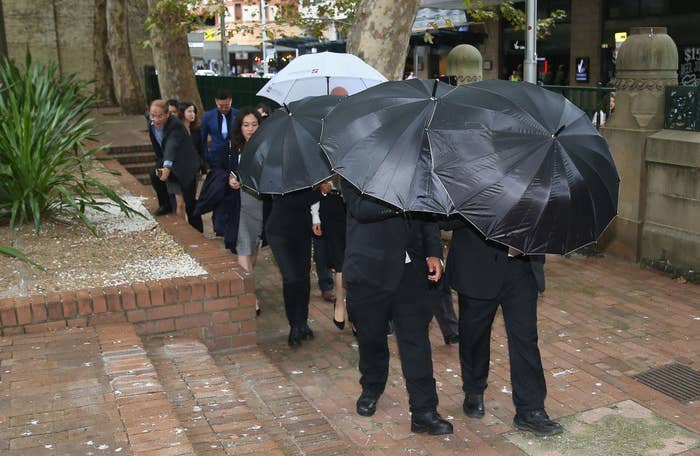
The vast majority of China's 1.3 billion people would recognise Jing Wang, the TV producer accused of raping a woman in Australia alongside film star Yunxiang Gao, a Sydney court has heard.
Wang and Gao, both 35, were in Australia to film the TV show Love In Aranya earlier this year when they allegedly raped a woman in a hotel room after a night out at dinner and a karaoke bar to celebrate the wrap of production.
The two men have each been charged with aggravated sexual assault and aggravated sexual assault occasioning actual bodily harm over the alleged events early in the morning of March 27 at the Shangri-La Hotel in Sydney.
Consent is likely to be the issue at trial, with forensic and CCTV evidence expected to prove Gao and Wang were at the hotel room with the woman, the court has heard.
Gao and his wife Xuan Dong are both famous actors in China, where the case has been reported widely. Gao was granted bail last week in a packed courtroom with numerous onlookers and journalists covering the case for Chinese media outlets present.
There were fewer people in court for Wang's bail hearing in the New South Wales Supreme Court on Friday afternoon, but all seats were nonetheless taken.
A witness named Wei Wei testified that he had seen numerous photos of Wang distributed across Chinese social media, particularly on Weibo and WeChat, since he was arrested.
The TV producer’s notoriety is such that if he fled to China he would be unable to live or work, as his absconding would be seen as an admission of guilt, Wei told the court – but his assertions were met with scepticism from the prosecution.
“When you say Mr Wang would be recognised by the average person in the street in China, you’re speculating aren’t you?” asked prosecutor Daniel Waldmann.
“No,” Wei answered.
“So you know for sure he would be recognised anywhere in China?” said Waldmann.
“Yes, I am sure,” replied Wei.
Justice Elizabeth Fullerton interjected to ask: “What is the population of China?”
“That is 13 billion,” answered Wei, prompting a number of people in the public gallery to murmur "1.3 billion”. Wei quickly corrected himself, clarifying it was in fact 1.3 billion.
“And you’re sure he’d be recognised everywhere he goes despite the enormity of that population?” asked Waldmann.
“Yes. In China social media is very popular … This matter is a very hot topic. It has been pushed into everyone’s smartphones as the hot topic.”
“You can’t really speak on behalf of 1.3 billion people,” Waldmann said.
“I understand that, but my acquaintances in China in the film and media industry also share the common view he will be recognised by the general public.”
Wang’s barrister, Ian Lloyd QC, argued Wang’s notoriety on Chinese social media means he would be unable to flee the country and escape trial if he was released on bail.
He also said Wang would not have the means or capacity to flee in any event: “My client has one passport. It’s in the possession of the police. Nothing has been put forward that suggests he has any ability whatsoever to leave this country by way of a false identity, a false travel document, a false passport.”
“I know that social media is ubiquitous throughout the world," Justice Fullerton said. "I also know that if there is a determination on the part of a person charged with a very serious criminal offence to abscond there are a whole range of ways you can duck beneath any radar."
“In the end, no system is foolproof, obviously," Lloyd said. "But the strictest of conditions have been offered.”
Lloyd said another reason Wang should be released is that he is being held in a pod with 100 other prisoners, none of whom speak Mandarin, and he can only communicate with them via hand signals.
“He speaks no English whatsoever," Lloyd said. "Maybe ‘Hello’."
“That’s not much,” replied Fullerton.
Waldmann argued that Wang was able to make phone calls to Mandarin speakers, but Lloyd contended calls from the prison could only last six minutes, or 10 minutes if inmates are speaking to their lawyer.
Lloyd also said Wang is “the bottom dog of the pod” because of his lack of English and that he has been pushed away from the phones by other inmates when he tries to use them.
“He can’t make a complaint because he doesn’t speak English,” Lloyd said.
Waldmann argued that the people who have offered to put up money or their homes as sureties for Wang do not have a close relationship with him, which detracts from the point of a surety.
“Money offered by his father, of all the sureties, is probably the only sum he would really not want to lose by breaching bail,” Waldmann said.
Gao was granted bail with a string of conditions, including electronic monitoring; reporting twice daily to police; surrendering his own passport and the passports of his wife, daughter and mother; using only one mobile phone with the number provided to the police; not going within one kilometre of Sydney International Airport; a 9pm-5am curfew; and that he must not contact any prosecution witnesses. He has also provided sureties of more than $3 million.
Fullerton noted that Gao is not before her and "there may well be two completely different bail outcomes" for the two men.
She will deliver her decision on Wednesday.
